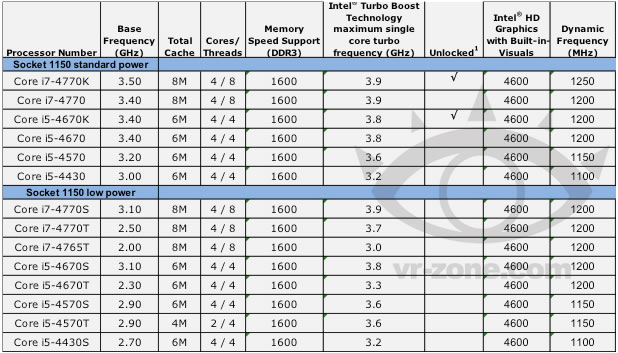I was reading an article about how intel will be using an even smaller NM process to make their CPU's, can't remember much of the details since I'm way to lazy to look it up. I think the CPU's gonna be made with a 15 nm process. Anyways, do any of you fine folk know when these new CPU's will be released? Specifically the one that will be replacing the I5. I'm building a gaming pc in the Summer so I would love to know.
Don't believe anything you read, because everyone who knows something are under NDA. No ones knows anything. I can promise you though, that Haswell will blow our minds.
Haswell?
The code name for the next generation
haswell is the next generation of Intel CPUs which looks dissapointing to say the least

with 5% better core speed, minimal architecture improvements and the same L2/L3 we may see 10% improvements at most
and the igp does have some improvements with 16 cores instead of 12, and it being slightly faster may put it at 15-20% faster which would make it equal to a 8600GT
As a "tick" processor, the haswell will carry many features from Ivy Bridge and will be 22nm. They will use DDR3 memory, though there is word of them uing DDR4 on the enterprise chips.
Performance over Ivy Bridge is unknown, but it will e better (obviously)
- zanginator
When will we see Steamroller? I will likely be upgrading my fx6300 to a 8core, hoping before next Christmas.
Q3 2013 or Q1 2014
@Zanginator
judging by the architecture changes and differences, they only seem to have really improved power usage by adding tons of voltage gating with no real performance benefits other than slightly higher stock clocks
2014 at the latest, which is honeslty too long.
Haswell is supposed to show a 15% improvements at the same clock speeds as Ivy bridge but the biggest difference to me is its supposed to Overclock much better than the Ivy bridge Cpu's which probably means being able to get at last 20% more performance if not more.
Id expect Haswell to be a larger jump than most people think because its an architecture change, Sandy to Ivy was just Nm shrink, new Archicetures usually show a lot of improvement over the previous gen like the difference between 1156 and 1155 processors.
you do know the GPU is on par with a 650m riiiiigh, they aren't trying to get faster CPU speed out of this genneration, they are trying to make it more power effecient, the genneration AFTER this will be focused on speed
"on par with a 650m" is nothing but overblown speculation and everything since then has shown the exact opposite with haswells igp not even being able to compete with first gen FM1 APUs let alone trinity or richland
haswell will not have 15% improvements at the same speed, and there are no major architecture differences besides power optimization
I'm sorry overblown wut now?
http://www.youtube.com/watch?v=VPrAKm7WtRk
that's a fairly simple diagram for something that's got billions of transistors in it
http://www.overclock.net/t/1347649/anandtech-intel-showcases-haswell-gt3-vs-nvidia-650m
nobody even takes that seriously
its not a very graphically demanding game to begin with especially with no AA or vsync
which can very easily be maxed by a 8600GT with no AA or vsync
http://www.youtube.com/watch?v=dSDiWG4cKMo
medium settings at 16FPS at a very low res
not counging the fact that FRAPS reduces FPS, CPU and the fact that that particular 8600GT probably has less RAM that the HD4600 in haswell
but considering the fact that HD4000 is comparable to a 6800GT and the fact that the HD4600 has only 4 more cores or 25% and 5% higher clock speeds, in perfect laboratory settings it would be a maximum of 30% faster, not the 500% needed to be comparable to a 650m
also heres a 8600GT running it on high
https://www.youtube.com/watch?v=0i19yqGdwuI
The real question. Back to solder or cheap TIM yet again?
seeing as they are going to lower wattage
more cheap TIM
Two pictures of the basic layout of a CPU doesent mean much, think for a second, within the same base archiceture (sandy bridge) with a shrink Intel Managed to get a 10% + Performance boost at the same clocks over Sandy Bridge with Ivy.
Haswell is keeping to the same NM size but its going to be more effecient (which usually also means faster clock for clock) and is also introducing new techologys that will more than likely boost its performance such as the ability to use AVX2 & FMA3 instructions and Intel is Introducing TSX Instruction set extention along with a few other technologys to help make tasks more effecient.
Not to mention Intel is saying it will have double the vector Performance of Ivy bridge, and the Ability to overclock highe due to refinements within the 22nm manufacturing process, yea id say a 15%+ performance increase is quite likely.
